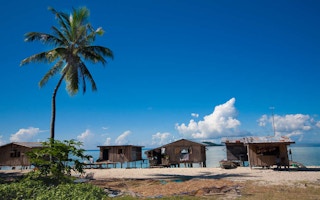While every country has agreed it is vital to keep the planet from overheating by more than 2°C, there is no sign in Warsaw that the political action needed to achieve that is possible.
As the negotiations dragged on through the final day and into the night, countries were still wrangling over details of draft agreements that will take another two years to negotiate.
A bleak assessment by the 44 countries that make up the Alliance of Small Island States is that politicians have not faced the reality of what is about to happen.
Even though they feel desperate about the lack of progress, delegates still avoid naming names to avoid diplomatic embarrassment. But one tired negotiator said: “We know that it is probably too late to prevent whole countries disappearing beneath the waves, but that is only a small part of it.
“There will be an intense escalation of global instability caused by trans-boundary migration of displaced people, massive hikes in the price of food causing civil unrest, and many more climate-related disasters. That is the situation we are walking into.”
Refusing liability
There have been several strands to the negotiations here. The developing countries want access to new funds from rich nations to prepare for the ravages of climate change. At these talks $100 million was pledged by developed countries, but it was unclear how much of it was new money, or existing aid money diverted to the climate from other sources.
Since at previous conferences countries have pledged to provide $100 billion a year of new aid by 2020, the Warsaw pledges are seen by developing countries as hopelessly inadequate.
But the most contentious issue was “loss and damage”. There is already a fund for adaptation to climate change, but the developing countries say that this does not cover irreversible losses, for example whole areas, even countries, disappearing into the sea. Other examples are loss of coral reefs and fisheries and the destruction of agriculture through climate change.
What developing countries want is a separate fund to cover these losses. But the richer countries fear this is an open-ended commitment they cannot afford, and they will never agree to it. They want to shift this issue into the adaptation fund and avoid the notion of being liable for compensation for climate damage.
Anyone for fudge?
The United States, China and the European Union are much keener to talk about the new international agreement due to be signed in Paris in 2015, in which all 194 countries that are parties to the Climate Change Convention will take on responsibilities to reduce or at least limit emissions.
A fourth draft of a proposed agreement to limit emissions, and a timetable for achieving them, are now being talked about. The optimists hope that countries will begin to offer new pledges to cut emissions beyond 2020 on 23 September 2014, when the UN secretary-general Ban Ki-moon has called a climate summit of world leaders in New York.
If this happens, then all the pledges can be examined over the following months to see whether countries have done enough to keep the temperature rise below 2°C. If scientists tell politicians that their pledges do not limit the rise enough, then there will be time for more to be done before aiming for final agreement in Paris in December 2015.
Perhaps the only bright part of the talks in Warsaw has been the attitude of China, now the world’s largest emitter of carbon dioxide. Partly because of domestic pressure to reduce pollution, the Chinese are making huge efforts at home to become more energy-efficient. There were even hints here from the Chinese delegation that their country would accept an emissions reduction target. This would be a remarkable transformation in attitude.
The final result in Warsaw will be a political fudge. It will be denounced by green activists and developing countries as too little progress, and probably too late to save the planet from unacceptable climate change. Increasingly, that looks like the correct assessment.










